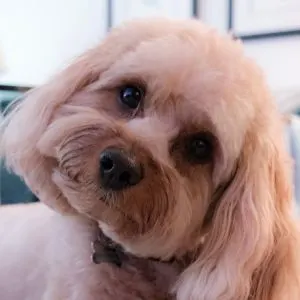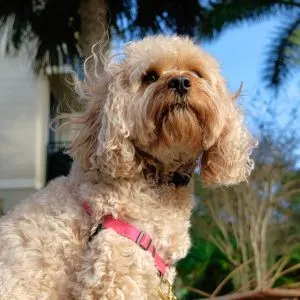Are you considering bringing a Cavapoo into your home? These adorable and affectionate dogs, a crossbreed between a Cavalier King Charles Spaniel and a Poodle, have captured the hearts of many.
But, like any decision involving a pet, it’s crucial to look at all sides of the equation. In this post, we’re taking a closer look at some of the reasons why you shouldn’t get a Cavapoo.
This insight comes straight from the experiences of Cavapoo owners themselves, who’ve shared their real-life challenges and considerations.
Before we go too far into the reasons why you shouldn’t get a Cavapoo (aka Cavoodle), it’s important to point out that the Cavapoo has many admirable qualities. In any discussion about this breed, you’ll find plenty of praise for their affectionate nature and low-shedding coats. We don’t need to focus on that since so many others already have.
Our goal is to provide you with a balanced view of what life with a Cavapoo is like to help you make an informed decision about welcoming one into your family.
Let’s dive in and explore what Cavapoo owners have to say.

13 Reasons Why You Shouldn’t Get A Cavapoo
Before we get started it is important to note that all dogs are different. Some Cavapoos will have many of the traits listed below and some will have none. Although genetics does play a role in the Cavapoo (or Cavoodle) personality and physical traits, training and their environment also plays a big role in how they behave when they are full-grown.
1. High Energy Levels
Despite their small size, Cavapoos are very energetic, something they inherited from their poodle parent. This high energy needs an outlet in the way of daily exercise and mental stimulation. They thrive on interactive play, walks, and activities that challenge their minds.
Potential owners must be prepared to dedicate time every day to meet their dog’s physical and mental needs. If you don’t have the time to exercise and train your dog, this is not the right breed for you.
Dogs with energy to burn will find a way to entertain themselves often through bad behaviors like destructive chewing or excessive barking.

2. Prone to Barking
Cavapoos have the tendency to bark often and loudly. Many Cavapoo owners were surprised at how loud their bark was considering they are small dogs. Plus, owners have reported that their pups will bark at the television, when people pass by the house, if they come to the door, or if they are left alone.
Now, not all Cavapoos are excessive barkers, and barking is something that they can be trained not to do, but you need to be prepared to deal with it.
3. Sensitive Stomachs
Some Cavapoo owners reported that their Cavoodle had a sensitive stomach. While not every Cavapoo will have a sensitive digestive system, it’s not uncommon for them to experience sensitivities, given that both parent breeds can have their own dietary sensitivities and health issues.
This sensitivity can lead to frequent digestive upset, requiring a carefully managed diet and potentially frequent vet visits to address gastrointestinal issues.
Owners must invest time in identifying and providing a diet that suits their Cavapoo’s delicate digestive system, often involving premium or specialized foods that can be more expensive.

4. Picky Eaters
Both the Cavalier King Charles Spaniel and the mini poodle are often viewed as picky eaters. Therefore, it’s not surprising that some Cavapoo owners report that their dogs can be finicky with their food.
Dealing with a Cavoodle’s picky eating habits can be a significant concern. This behavior may lead to nutritional imbalances and requires extra effort, patience, and potentially higher costs to find food that meets both their health needs and taste preferences. Such challenges with feeding can complicate daily care, making it an important factor for potential owners to consider.
5. Resource Guarding
Another potential challenge that was reported by some Cavapoo owners was their dog’s resource guarding. This behavior involves the dog showing possessiveness over certain items or resources, such as food, toys, or even people, often leading to growling, snapping, or biting when they feel these resources are threatened.
Resource guarding can stem from a variety of factors, including genetics, early experiences, or competition for resources. While not all Cavoodles will exhibit this behavior, it’s a possibility that prospective owners should be aware of.
Addressing resource guarding requires patience, consistent training, and sometimes the help of a professional dog trainer or behaviorist. It can be a significant concern for households with children or other pets, where interactions over resources are more likely.

6. High Maintenance Grooming Needs
Cavapoos inherit their luxurious, often curly or wavy coat from their Poodle ancestry, which demands regular grooming to stay healthy and mat-free.
This includes frequent brushing, at least a few times a week, and professional grooming sessions every 4 to 6 weeks to trim their hair and prevent it from becoming matted. Neglecting their grooming needs can lead to skin issues, discomfort, and even infections for the dog.
The commitment to maintaining a Cavoolde’s coat is not only time-consuming but can also be costly, making it an important factor to consider for potential owners who may not have the resources or lifestyle to accommodate such intensive grooming needs.
7. Colors can Fade
It is not uncommon for a Cavapoo’s fur to change color. This trait is inherited from the Poodle parent. Poodles can carry genes that cause their coat color to lighten as they mature. This is a well-documented phenomenon in certain coat colors, such as black turning to blue or silver, and browns fading to a lighter café-au-lait shade.
8. Velcro Dog
A notable characteristic of Cavoodles that might give potential owners pause is their reputation as “Velcro dogs.” This term refers to their tendency to form very strong attachments to their owners, often following them around closely and seeking constant companionship.
While this trait can be endearing, it also means Cavapoos can struggle with being left alone, potentially leading to separation anxiety. This anxiety can manifest in undesirable behaviors such as excessive barking, destructive actions, or signs of distress.
For individuals or families with busy lifestyles, long work hours, or frequent travel, managing a Cavapoo’s need for near-constant companionship can be challenging.

9. Unpredictable Size
The unpredictability of a Cavapoo’s adult size can pose a challenge for some potential owners. This poodle mix can vary greatly in size. Some owners stated they were expecting a 20-pound dog, but instead they ended up with a Cavapoo that was 30 pounds.
10. Potential Health Issues
When considering a Cavapoo, it’s important to be aware of the potential health issues that may affect this crossbreed. Here are some of the health challenges that can lead to significant veterinary expenses and require ongoing management:
- Heart Conditions: Such as mitral valve disease, commonly found in Cavalier King Charles Spaniels.
- Eye Problems: Including progressive retinal atrophy, prevalent in Poodles.
- Joint Disorders: Like hip dysplasia, which can affect mobility and comfort.
- Skin Conditions: Cavoodles may be prone to various skin issues, leading to discomfort and requiring treatment.
- Ear Infections: Their floppy ears can trap moisture and debris, leading to infections.
Choosing a reputable breeder who conducts thorough health screenings on their breeding dogs can help reduce these risks, though it’s not a guarantee against all health problems.
11. Allergy Considerations
Although often marketed as hypoallergenic due to their Poodle heritage, no dog is completely free of allergens. Cavapoos can still produce dander and saliva that may trigger allergic reactions in sensitive individuals.
Prospective owners with allergies should spend time with the dog or puppy before deciding to bring them into their home.

12. Cost of Ownership
The cost of owning a Cavapoo should be thoroughly considered before getting a Cavapoo. The initial purchase price of a Cavapoo from a reputable breeder can be quite high, reflecting their popularity and the costs associated with ethical breeding practices. However, the financial commitment doesn’t stop there. Ongoing expenses can accumulate, including but not limited to:
- Routine Veterinary Care: Regular check-ups, vaccinations, and preventative treatments for parasites are essential for keeping a Cavoodle healthy.
- Grooming Needs: Cavapoos require regular professional grooming sessions which can add a considerable amount to annual pet care expenses.
- Quality Diet: Providing a high-quality diet suited to their nutritional needs and sensitive stomachs can be more expensive than standard dog food.
- Training and Socialization: Proper training and socialization classes, especially in their formative puppy months, are crucial for behavioral development but also entail additional costs.
13. Long-term Commitment
Adopting a Cavapoo requires a long-term commitment that might not suit everyone’s lifestyle or future plans. Cavoodles can live for many years—often up to 10-15 years or more.
Before deciding to bring a Cavapoo into your life, it’s essential to reflect on whether you’re prepared for the long-term emotional, financial, and time commitments required.

